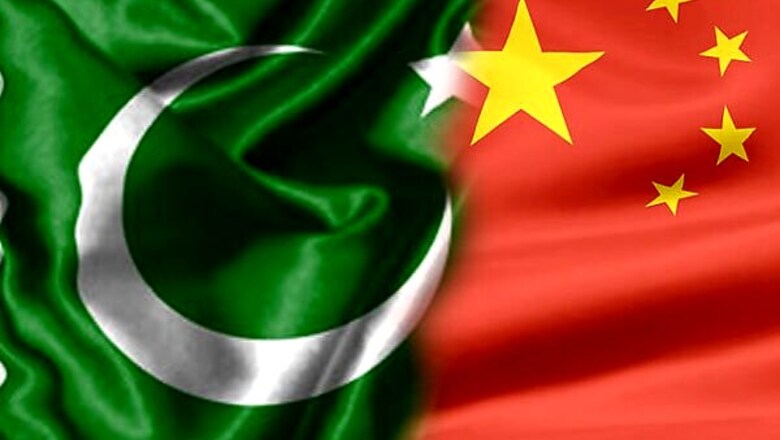
views
In rare candid admission that the "all weather" ties between China and Pakistan are running out of fizz, Chinese state-run strategic think tanks say that the decades-old relationship needs "new form of inspiration" as it is confronted with "new challenges".
"The China-Pakistan relationship, one of the most long-lasting strategic and cooperative partnerships, is confronted with new challenges," an article titled 'Long-lasting Sino-Pak friendship needs new form of inspiration' published in the state-run Global Times here today said.
The article, which is a compilation of views from strategic analysts from both countries during their annual "think-tanks" meeting held recently said the past emphasis it is the "most important" relationship is a "comparative expression" with its importance more in the regional context than in the global arena.
"The China-Pakistan relationship is always regarded as one of the most important bilateral relationships for both countries. However, most important is a comparative expression. We should figure out how this relationship earns this superlative form of speech," Ye Hailin, editorial director of South Asian Studies, Chinese Academy of Social Sciences said in his presentation.
"The relations between China and Pakistan can only be included within regional issues, compared with the global relations between major powers such as China, Russia and the US," Ye said apparently referring to the importance of this relationship in the context of China-India relations, which in recent years showed signs of improvement.
"The changes in terms of the internal economic requirements and the external security needs have urged us to consider if we need to attach more importance to China-Pakistan relations," Ye said.
Chinese and Pakistani leaders always described their relations as "deeper than oceans and higher than mountains", rarely acknowledging the widely held perception that it was mainly aimed at containing India.
"Since the 21st century, although both countries keep stressing the China-Pakistan friendship, they have realised that there are some problems with their close relationship, especially in terms of economic exchanges," Ye said.
That is also why both leaderships decided to focus on the "strategic meaningfulness" of their bilateral relationship by introducing more "solid projects", such as the economic corridor which aims to connect China's Xinjiang with Pakistan Gwadar port, he said.
"These decisions are very important, because they have nailed down this long-standing friendship," he said.
"Besides the need for economic collaboration, China and Pakistan cannot underestimate the acuteness of furthering their political and security cooperation. The overly lopsided attention on economic cooperation is likely to cause negative impact over the regional security framework," he said. While the two governments made moves to strengthen the relations, "but people from both countries must resort to feasible actions to make it come true", Ye said.
Many Chinese analysts stress that the 2000-km-long corridor with highways, gas and oil pipelines faced serious security challenges in view of the prevailing internal security challenges in Pakistan.
Deng Junbing, former counsellor of the Chinese Embassy of Pakistan, Indonesia and India who took part in the deliberations said over the recent years, strategic cooperation on China-Pakistan economic development has not been "close enough".
"Pakistan's security situation has been worsening, which affects the progress of cooperative projects. Medium and small-sized enterprises are not enough to participate in these projects. In China-Pakistan trade, Pakistan has long been running a trade deficit," he said.
China and Pakistan should raise their economic cooperation to a strategic level so as to speed up the process of regional economic integration.
"To fulfill this plan, China and Pakistan should kick off the relevant projects as soon as possible, and solicit opinions from the responsible departments," he said.
Senator Mushahid Hussain, a former Pakistan Minister and Chairman of Pakistan-China Institute said "China provides a diplomatic and security umbrella to Pakistan, serving as Pakistan's voice in the UN Security Council and in the G20".
"China helps Pakistan warning off bullying and blackmail from our distant 'godfathers' and their recent proxies. Whenever Pakistan is in a crisis, China is the first country to give its help," he said.
On how the two countries could define the relationship in the present context, Hussain said China has emerged as the pillar of Asian century due to shift in the balance of the economic and political power from the West to the East.
"The declining of the West is evident with the failures of wars in Iraq and Afghanistan, and the pillar of the Asian century is China," he said.
From the regional cooperation perspective, he spoke of greater South Asia which included China, Myanmar and Afghanistan.
"Traditional South Asia consists of India, Pakistan, Sri Lanka, Bhutan, Nepal, Bangladesh and Maldives. There is a greater South Asia as an economic engine which includes China, Myanmar and Afghanistan and so on emerging combined together by roads, railways and pipelines," he said.
Also he said there is a "new great game" to contain China.
"This new great game is a new version of the cold war," he said.




















Comments
0 comment